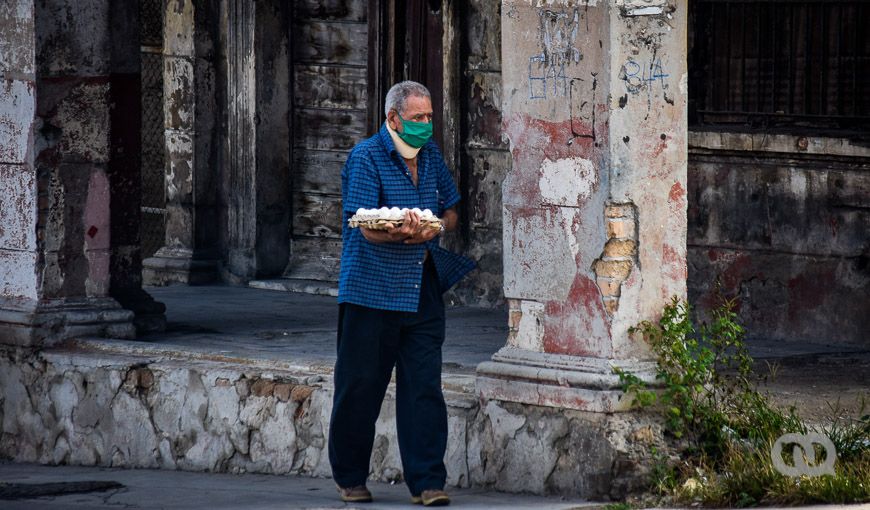The right to food is a basic human right. Article 25 of the Universal Declaration of Human Rights defines this as regular, permanent, and free access to food, that is adequate for a person’s health and well-being. The document also gives similar importance to a people’s cultural traditions “that guarantee physical and mental integrity, and a happy and dignified personal and collective life free from anguish.” A sound and stable diet therefore acts as a form of social transmission, it improves wellbeing, reduces stress, and contributes to a greater sense of belonging, comfort, and security.
After two economic crises in Cuba, conditions for Cubans’ right to food have been disrupted especially in everyday food-related activities. Actions that influence what and how Cubans are eating on the island include waiting in line, socializing and bartering for rationed goods. When the consumption, exchange and resale of rationed goods isn’t enough, many Cubans must search for other products using illegal channels or, if this isn’t an option, go to great lengths and resources using alternative means.
In interviews for the Food Monitor Program, a program that observes food (in)security in Cuba, limited access to basic foods was identified, which affects most Cuban families’ everyday lives. These problems were described by several survey respondents who say, “they are always ready to wait in a line.” A mother, a health professional, living in Havana stated:
“I’d say I spend the 30 days in the month with its 720 hours looking for food, because from the minute I wake up I need to figure out, ask around and find where I can get something to eat. Going about your everyday business, you’re always on the lookout in case some food appears.”
Eating when there are food shortages means resorting to alternative, improvised and even baroque ways of making food. Ever since the coyuntura or “temporary situation” was announced, as well as the COVID-19 pandemic making matters worse, cooking methods have changed a great deal because Cubans have to invent, improvise, and be resilient so as to survive another day. Since 2020, Facebook groups have been created with over 15,000 members who share recipes to make the most of and replace hard-to-find ingredients (rice mayonnaise, spaghetti croquettes, homemade yoghurt using powdered milk). One of these group’s members explains:
“Along with the staples, bread, crackers and sodas have also began to disappear. There came the time that I was stuck in the kitchen from the moment I opened my eyes in the morning. I can tell you that in these nearly two years of the pandemic, I have learned many new recipes I didn’t know before, but it has taken a toll on my personal life for sure, as I now spend a lot more time in the kitchen than I do on other things. In other words, Cubans’ lives now boil down to working, looking for food and cooking.”
Another example is how portions are distributed within the household, where more vulnerable family members are put first, which implies sacrifice and gender-distinction, because a mother will always serve her children more. Efforts to ensure healthy and appealing foods at one’s own expense was a concern that many mothers repeated in the survey. A 54-year-old woman living in Havana and a mother of a son says:
“I try and make sure we all eat properly, but I always give priority to my son, sometimes he himself says: mama, what about you?” To which I reply: “Papito, milk doesn’t sit well with me, I can’t drink it because it gives me a tummy ache, you have it,” or “I already ate while you were showering,” so that he doesn’t reject the food I give him because he has a good heart and says that he won’t eat if I don’t eat, but we have had days where I’ve just eaten rice and beans so he can have the protein.”
Cuban reality today, in addition to multi-sector problems, both domestic and regional, has led to the perception that this crisis is a lot worse than previous ones. A grandfather shares his experience during times of greater restrictions as a result of COVID-19 health measures in Havana:
“We’ve had it really rough these past two years here, I’ve never seen myself like this, not even during the famous Special Period [of the 1990s]. My daughter and I spend most of our days eating bread with oil and salt so the children can have the protein product because we couldn’t get anything at the store. Then, we started buying on the black market, but we couldn’t keep doing that, so I decided to go early in the morning to take my place in line to make sure we got something, and I’ve got two 2000 peso fines for doing that, and I haven’t been able to claim anything back.”
When asked whether food tastes and preferences have changed, the majority of those surveyed said that these haven’t. The things they long for and want are still the same, even more so when they remember times of greater prosperity, but people generally aren’t able to pick between one product and another: “the problem is you have to buy whatever there is. I haven’t had this dilemma because there isn’t a great deal to choose from or money to buy it all.”
Tension, stress, and uncertainty are the words used to describe people’s everyday activities in Cuba to get food they consider decent and appealing for themselves and their families. Given the burden these tensions have in Cuban reality, dealing with the country’s right to food must go beyond conventional parameters. The narrative focused on fair distribution and on the Government’s temporary programs aren’t enough to encompass the different expressions of what it means, both unspoken and culturally, to put decent food on the table.
If food security is a key factor for progress and civic action, it is for our identity too. Stability and safeguards when it comes to any human group’s eating habits helps them to affirm their diversity, hierarchy and organization, it’s a cultural habit, but is also controlled by society. Therefore, it’s important to ask what the real impact of shortages will have on two generations of Cubans that have dedicated more of their day to strategies marked by scarcity? While those surveyed had the common goal to put a plate of food on the table, we will see how tastes, traditions, cooking techniques and food-related values change Cuba’s heritage towards a declining food culture of shortage.
*We ommitted or changed the identities of those surveyed in line with our data protection policy. Testimonies from the survey can be found here.
This article was translated into English from the original in Spanish.


If you believe that our journalism is important for Cuba and its people, we want you to know that this is a critical moment.
Behind each publication there is a team that strives to ensure that our products meet high quality standards and adhere to professional and ethical values.
However, to keep a close watch over government, demand transparency, investigate, analyze the problems of our society and make visible the hidden issues on the public agenda is an effort that requires resources.
You can contribute to our mission and that is why today we ask for your help. Select the way you prefer to send us a donation.









comments
We moderate comments on this site. If you want to know more details, read our Privacy Policy
Your email address will not be published. Mandatory fields are marked with *